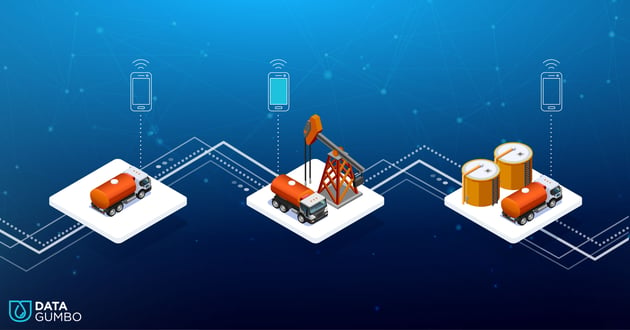The Future of Oil and Gas is on the Blocks
With anything blockchain, there’s a hedging for adoption and the oil & gas industry is no different. Companies often skirt the first position and instead search for safety in numbers when it comes to taking up innovative technologies. Like a school of fish in need of camouflage, straying ahead to lead the charge comes with risk and, worst case, failure. But it can also yield great reward.
Leveraging Learnings Together
One sought-after modality of protection and a source of strength in implementing new technology is the consortium or strategic alliance. Two forerunners touting organizational momentum in the blockchain space for oil & gas include:
Oil & Gas Blockchain Consortium
As the first industry blockchain consortium in the U.S. that resides under the Offshore Operations Committee (OOC), this membership-based model boasts 10 oil & gas companies including Chevron, ConocoPhillips, Equinor, ExxonMobil, Hess, Marathon, Noble Energy, Pioneer Natural Resources, Repsol and Shell. Its mission aims to build a foundational network of business partners to collaboratively advance blockchain technology for broader adoption by the greater industry.
Houston Blockchain Alliance
A self-branded unbiased, neutral platform for cooperation in the blockchain space housed in the Greater Houston Region, this alliance partners with individuals, startups, corporations and government to champion blockchain technology. Dedicated to bringing together influential individuals in the blockchain ecosystem, it is highly focused on uniting innovation with traditional economy.
These groups unite interested parties dedicated to reimagining current standards and work together to explore innovative technology solutions. The ultimate goal: to derisk solutions as a group then drive widespread industry adoption.
Stepping Up to Bat
Likewise, certain oil companies are stepping up to the plate when it comes to tech innovation. In taking leadership roles, big hitters like Shell, ExxonMobil, Saudi Aramco and Equinor are including blockchain as part of their growth strategies. Shell’s blockchain tech lead recently stated in Forbes that blockchain’s potential to deal with data and algorithms differently allows for a complex decentralized system that enables parties to manage, monetize and automate transactions.
What follows the giants are vendors and service providers to keep pace as the ecosystem for oil & gas on the blockchain grows and evolves.
Parallel Exploration
The various technical benefits blockchain boasts include its inherent immutability of data, instantaneous validation, consensus for multiparty processes and the ability to reduce reconciliation friction make it applicable to numerous aspects of oil & gas. Several examples include:
- Supply chain
As a complex network of suppliers, shippers and contractors, blockchain presents much needed visibility and transparency into the global supply chain. By streamlining downstream, midstream or upstream operations, blockchain technology mitigates error risk by creating an immutable record to replaces tedious paperwork that drives unprecedented speed of business and efficiencies. - Land trades
Creating an auditable trail of land movement, value and ownership with blockchain will reduce disputes, mismatched or misplaced titles and provide transparency into land transactions in real time. - Commodity trading
The average commodity trading transaction involves approximately 36 original documents, 240 copies and 27 involved parties according to Global Trade Review. The volume and frequency of transactions in commodity trading backed by blockchain will drive forward fully transparent, secure recording practices. Blockchain technology allows for real-time monitoring and the exchange of documents in a secure, digital and decentralized fashion. - Joint interest billing
Sharing costs, revenues and providing auditability for compliance measures among multiple parties on an agreement is a time and labor-intensive process that yields complex agreements. By using a blockchain ledger for joint interest billing in oil & gas, smart contracts guarantee transparency and consensus for all parties reinventing the laborious process of defining, negotiating and executing contractual conditions.
The Future is on the Blocks
As we know it today, the world wide web has radically altered consumer habits. Blockchain heralds a similar change for the future of the commercial internet. As an immutable ledger, blockchain provides a central source of truth that delivers simultaneous visibility and transparency across multiple stakeholders, vendors and customers regardless of environment or industry.
Already major industry players — including those in oil & gas — are implementing blockchain networks to drive forward unprecedented efficiencies with smart contracts, reduced market friction and to disintermediate categories of middlemen to transform the very nature of how business is done. While blockchain won’t be mainstream for approximately another five years, the compelling ROI exists now. The future is on the blocks and those that take the jump now will be able to reap the most rewards as the blockchain network grows and matures.
This article originally appeared at OILMAN Magazine.



